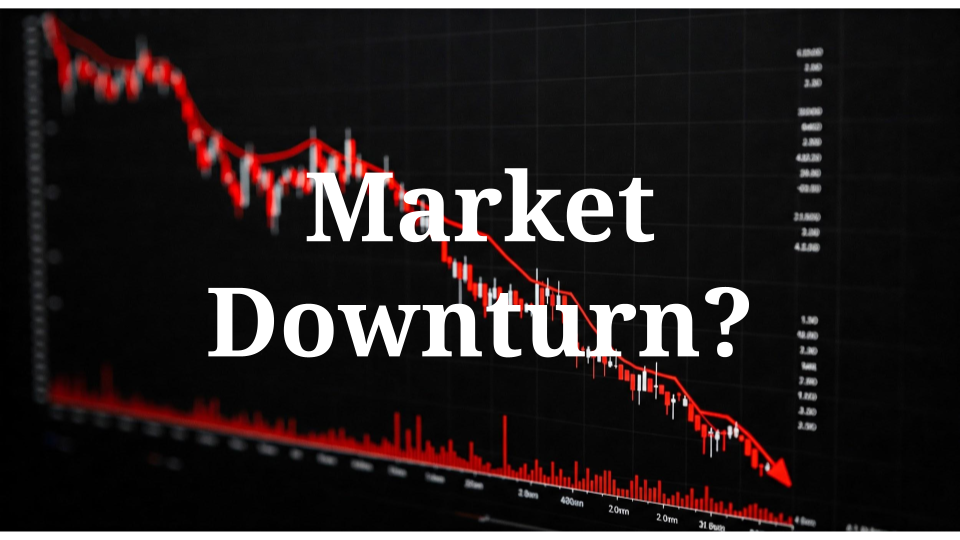Feeling Anxious About the Market? Focus on What You Can Control
/Market volatility can feel nerve-wracking, and it's completely normal to feel uneasy during downturns. But remember this: market fluctuations are a normal part of the economic cycle. Instead of feeling helpless, let's focus on actionable strategies you can control to weather the storm, manage your emotions effectively, and avoid panic decisions driven by fear or uncertainty.
It's understandable that market volatility causes anxiety. Whether it's driven by economic news, geopolitical events, or trade tensions, the market's ups and downs can feel unpredictable and unsettling. However, history provides a valuable perspective: market downturns aren't anomalies; they are a recurring feature of the economic landscape. We've seen this play out in the past with significant events like the COVID-19 downturn in 2020, the Global Financial Crisis in 2008, and the Dot-com bubble in 2000.
Here's a crucial point to consider: missing just a few of the market's best days can significantly reduce your long-term returns. This is why letting emotions dictate your investment decisions can be so detrimental. The chart below illustrates the potential impact on your growth if you missed some of the best trading days.
Mastering Your Emotions
One of the biggest challenges during volatile periods is managing our own emotions. Fear can lead to panic selling at market lows, while greed might tempt us to chase fleeting gains. Often, controlling these emotional responses is the most significant factor within our control and can have a profound impact on our investment outcomes.
It's helpful to be aware of common behavioral biases. Loss aversion, the tendency to feel the pain of losses more strongly than the pleasure of gains, can drive poor decisions. Similarly, herd mentality, following the crowd without considering your own individual circumstances, can lead to buying high and selling low.
Here are some practical tips to help manage your emotions during market volatility:
Focus on your long-term investment plan. Remember the goals you set and the reasons behind your investment strategy.
Limit how frequently you check your investment accounts. Constant monitoring can amplify short-term market noise and trigger emotional reactions.
Educate yourself about market cycles. Understanding that downturns are a normal part of the process can help reduce anxiety.
Consider seeking advice from a financial advisor. Advisors play a crucial role in providing emotional support and guiding you through challenging times. They can act as an "emotional circuit breaker" to help you avoid impulsive decisions that could harm your long-term financial health.
Controllable Investment Strategies
While market movements are outside our direct control, there are several investment strategies you can utilize to navigate volatility.
Dollar-Cost Averaging: This strategy involves investing a fixed amount of money at regular intervals, regardless of the market price. When prices are low, your fixed investment buys more shares, and when prices are high, it buys fewer. Over time, this can help reduce the risk of buying high and potentially lower your average cost per share, especially during downturns. Consistency is key to the effectiveness of dollar-cost averaging.
Account Rebalancing: Maintaining your target asset allocation (the mix of assets like stocks and bonds based on your risk tolerance and time horizon) is crucial. Market downturns can cause your portfolio to become skewed, with some asset classes potentially becoming overweighted or underweighted. Rebalancing involves selling some assets that have performed well and buying those that have underperformed to bring your portfolio back to its target allocation. This strategy can help you buy low and sell high over time and stay aligned with your intended risk level.
Roth Conversions: A Roth conversion involves moving funds from a traditional IRA or 401(k) to a Roth account. While you'll pay taxes on the converted amount in the current year, future withdrawals in retirement can be tax-free. A market downturn, when asset values are lower, can be a potentially opportune time for a Roth conversion, as the tax bill on the conversion may be lower. However, it's essential to carefully consider the tax implications and your future tax rates before making this decision.
Tax-Loss Harvesting: Tax-loss harvesting is a strategy of selling investments that have lost value to offset capital gains taxes you may owe on other investments. The proceeds from the sale can then be reinvested in a substantially different security to maintain your desired asset allocation, being mindful of the wash-sale rule, which prohibits repurchasing the same or substantially identical security 30 days before and 30 days after. This strategy can potentially reduce your current tax burden.
Staying Invested and Reviewing Your Long-Term Plan: It's crucial to remember that historically, the market has recovered from previous downturns. Selling out of your investments during a downturn can lead to missing out on potential rebounds. Downturns can also be a good time to revisit your overall financial goals and ensure your investment strategy still aligns with them.
“The four most dangerous words in investing are: This time it’s different.”
Historical Perspective
Looking back at historical events like the COVID downturn in 2020, the 2008 Global Financial Crisis, and the 2000 Dot-com bubble, we can see a common pattern. While these periods were marked by significant market declines and uncertainty, the market eventually recovered and continued its long-term growth trajectory. This historical context reinforces the importance of a long-term investment perspective. Here is what the positive and negative years have looked like since 1926.
Staying the Course for Long-Term Success
Market volatility is an inherent part of investing, but by focusing on controllable strategies and maintaining a long-term perspective, you can navigate these periods effectively. Stay disciplined, stick to your long-term financial plan, and avoid making impulsive decisions based on short-term market fluctuations.
If you don’t have a long-term financial plan, then now is the time to create one. If you would like help, feel free to reach out and connect.
Fiduciary Financial Advisors, LLC is a registered investment adviser and does not give legal or tax advice. Information presented is for educational purposes only and does not intend to make an offer or solicitation for the sale or purchase of any securities. The information contained herein has been obtained from a third-party source which is believed to be reliable but is subject to correction for error. Investments involve risk and are not guaranteed. Past performance is not a guarantee or representation of future results.





























































